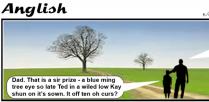“How many” or “how much” can be expressed through the use of quantifiers. A few tips and a handy infographic will take the mystery out of these helpful word tools.
To download high resolution poster click here
What is a Quantifier?
A quantifier is a word or short phrase that adds an amount or a number to a noun. It generally precedes the noun it modifies, but another modifier or two may separate them, and a helper may be required (usually “of”). The quantifier is shown in bold, and its noun is shown CAPITALIZED.
“Tracy ate some of her SPINACH.”
“Her mother did not think she had eaten enough SPINACH.”
“Before leaving the table, Tracy was required to eat all of her SPINACH.”
Count and Noncount Nouns
The most important step in selecting a quantifier is deciding whether the noun is “count” or “noncount.” Some nouns can be counted: horses, cheeseburgers and rocks. Other nouns cannot be counted normally and are not pluralized: rice, traffic and gold.
Some work with both count and noncount nouns: any, enough, a lot or lots, plenty, a lack, all, this, that, some, none and most.
“Any HORSE will eat grass.”
“Enough of the RICE was left for seconds.”
“He had a lot of TIME left.”
Some work only with count nouns: several, neither, both, either, a couple and each.
“Several HORSES escaped.”
“Neither CHEESEBURGER had pickles on it.”
“Bob threw both ROCKS at me.”
“Choose either PANCAKES or BISCUITS for breakfast.”
Certain quantifiers only work for noncount words (things that cannot be numbered): a little, much (not much, too much), a bit, a great deal and a good deal.
“A little RICE fell out of the bag.”
“Luckily, there was not much TRAFFIC.”
“One artist likes to use a bit of GOLD in his paintings.”
“After the flood, our basement had a good deal of grungy, standing WATER.”
Few
This quantifier is used in many ways and has even produced some idioms. It is used with count nouns and means “not many.”
“Other than tigers and jaguars, few cats like water.”
“I only have a few dollars.”
“Few” in Idioms
Some idioms based around a quantifier do not require the noun described, and the meaning of some of these idioms is opposite the original quantifier.
“Quite a few”: many.
“Bill ate quite a few cheeseburgers.”
“Quite a few teams use red as their team color.”
“Few and far between”: scarce or rare.
“In Portland, Oregon, snowstorms are few and far between.”
“That dog smells; his baths are few and far between.”
“A few too many”: someone has had too many alcoholic drinks. In past tense, “had had” can occur and may seem awkward; a contraction might make it less clumsy.
“When Betty begins talking to her purse, she has had a few too many.”
“Ralph wouldn’t drive because he’d had a few too many.” (“–he had had a few too many.”)
There are other quantifiers that have idioms associated with them, and some are completely opposite of the original quantifier. Can you think of any?



![How to master predicates [infographic]](https://www.grammar.net/wp-content/uploads/2013/05/predicates_web-308x95.jpg)
![Comma Splices [infographic]](https://www.grammar.net/wp-content/uploads/2013/07/CommaSplice_small-01-2-308x95.png)



